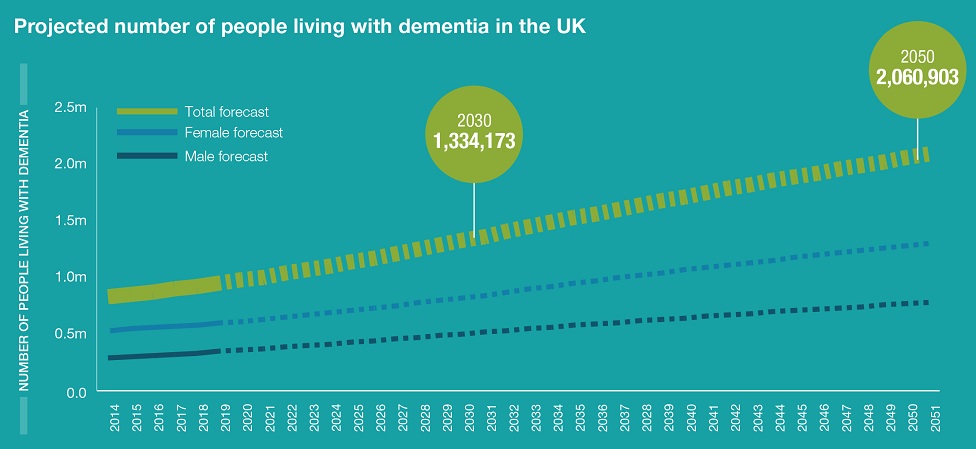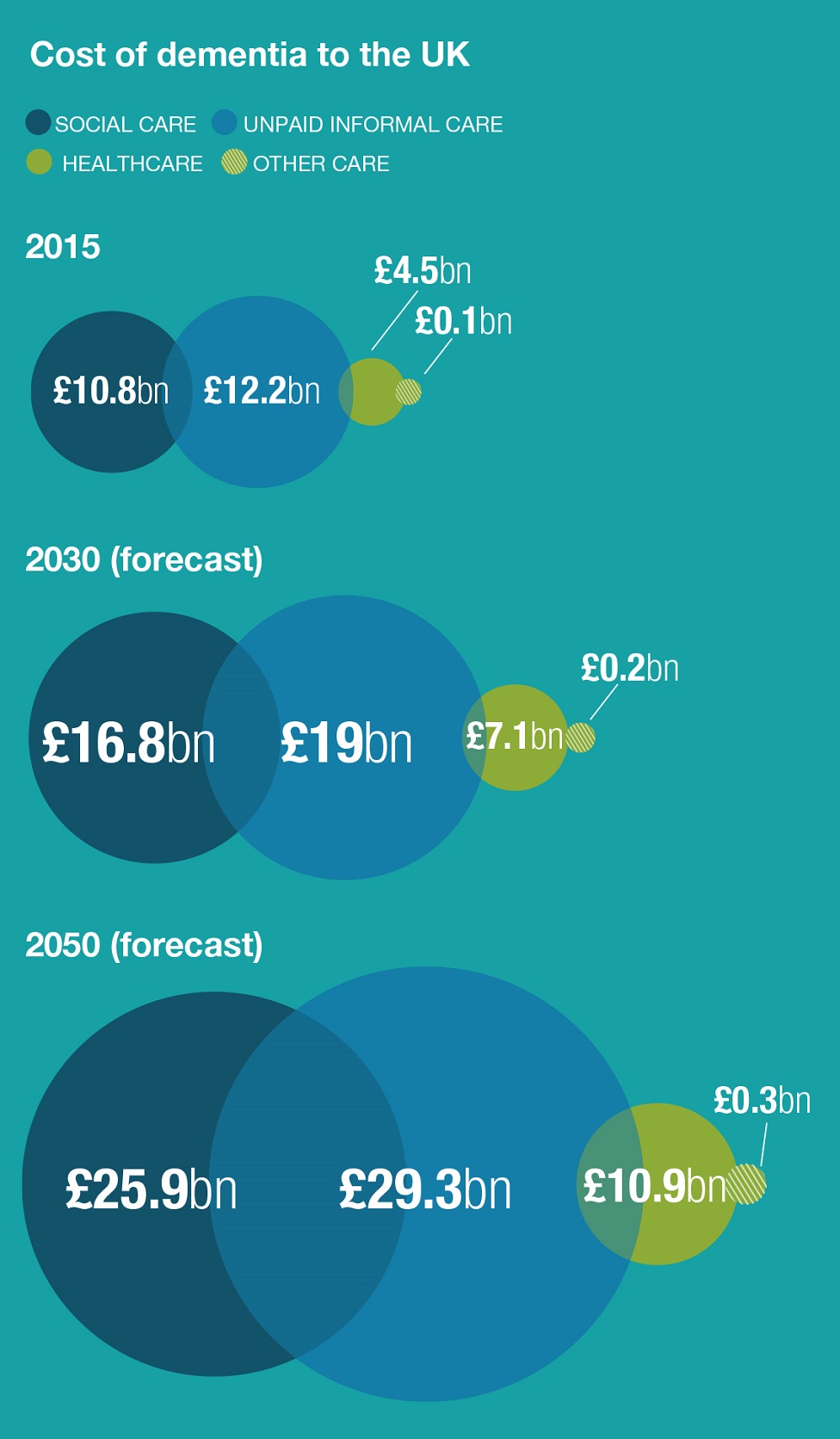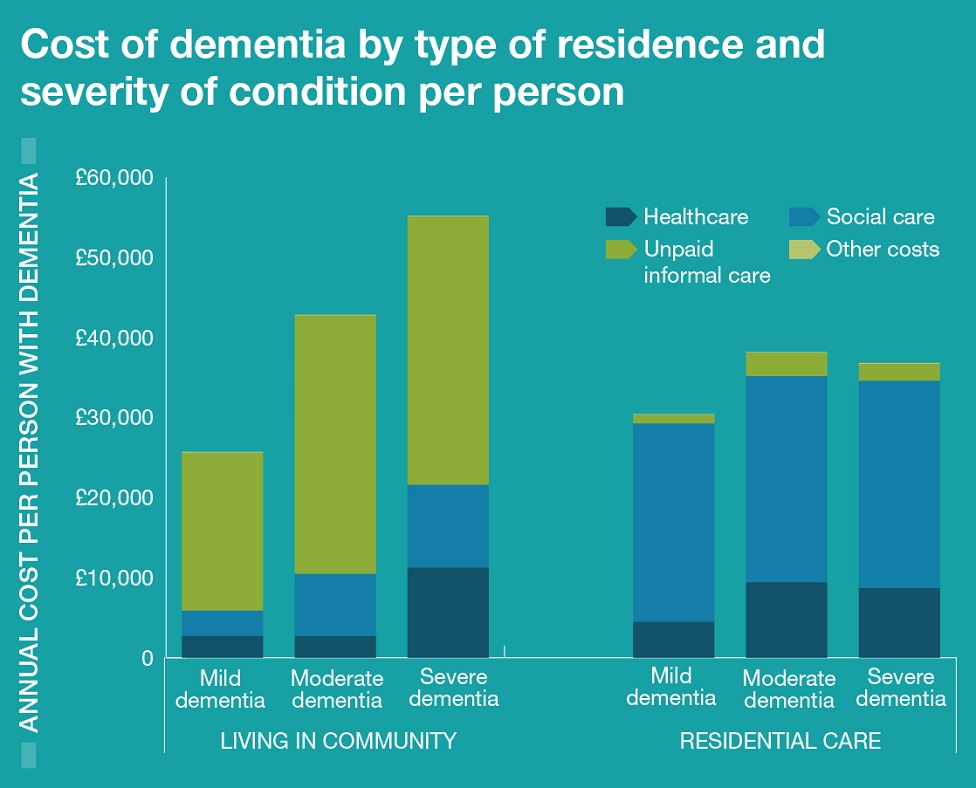The importance of dementia-friendly Retirement Living
The global trend of an ageing population has contributed to dementia being identified as one of the major public health issues of the 21st century.
7 minutes to read
There are approximately 850,000 people in the UK with dementia as of 2015. This figure is predicted to rise 35% by 2025 and 140% by 2050 to 2 million people in the UK.

Suitable safe housing and the delivery of cost-effective care are two of the most important concerns when a family-member is living with dementia.
Many traditionally built family homes in the UK are not always suitable for those living with the condition, and in many cases, delivering healthcare directly into family homes can be costly.
As dementia rates increase and the cost to our economy also rises, it will become increasingly important to deliver care in a more efficient safe setting – whilst keeping individuals living in their own homes for as long as possible. Retirement Living can play an important role in housing an ageing population in this context.
"There are approximately 850,000 people in the UK with dementia as of 2015. This figure is predicted to rise 35% by 2025 and 140% by 2050 to 2 million people in the UK."
What is dementia?
Dementia is caused by specific age-related diseases, including Alzheimer’s, which affect the brain and result in the decline in one or more cognitive functions such as memory, language, behaviour, personality, or emotion.
It can significantly affect an individual’s quality of life. The spectrum of dementia is as diverse and complex as the disease itself. For some it is a rapid and inconsistent decline in multiple cognitive functions. For others it can be a much slower and consistent process.
Although dementia is not a normal part of ageing, many of the cognitive functions which experience clinical decline are functions which, in isolation, experience some degree of organic decline as a natural part of the ageing process.
This not only highlights the difficulty and complexity of diagnosing the disease itself, but also identifies perhaps the greater challenge; being able to recognise advance symptoms to initiate an early diagnosis and implement an appropriate care-plan.
Early diagnosis is key to preventing an often rapid decline in quality of life. It initiates conversations and importantly formalises decisions regarding necessary care.
Why many family homes may not always be suitable environments
Aspects of the built environment which have perhaps never been given much consideration can turn into obstacles for those with dementia. Simple changes in levels, such as steps and stairs, can inhibit movement or cause falls, changes in tonal contrasts between flooring materials can cause distress and confusion.
In addition, the inadequate provision of natural light creates another issue as sunlight is a key component to improving and maintaining well-being, according to Marchese Partners, specialist architects in Retirement Living homes.
Loneliness is another potential challenge for those with dementia especially given the high proportion of older people who live alone.
The health and well-being of a person with dementia is related to their social relationships with family, carers and other residents. In some cases the stigma of having dementia can increase the social isolation of older people living with the condition.
Conversely, accommodation which has been specifically designed to support ageing positively can promote and enable inclusive and equal access to services and amenities for all residents regardless of mobility or cognitive functions.
Care and support
According to research conducted by the Alzheimer’s Society, some 39% of those living with dementia over the age of 65 are living in either residential care or nursing homes.
This leaves almost 500,000 over-65’s with dementia who are currently living outside of a specialist care environment. Many will be doing so successfully, but a lack of adequate residential care facilities, especially in comparison to peer countries, may cause some issues.
"Dementia has higher health and social care costs than cancer and chronic heart disease combined, and it is estimated to have cost the global economy some $818bn in 2015 according to Alzheimer’s Research UK."
In addition to declining cognitive functions associated with dementia, the normal ageing process requires multidisciplinary care and support services.
Physiotherapy, occupational therapy, cooking and household assistance are widely documented to benefit an individual when collectively provided in a consolidated service.
The cost of dementia
Dementia affects individuals, as well as their families and communities. It also has far reaching implications for the economy.
The delivery of care should be considered in a holistic way to ensure it is delivered efficiently. Dementia has higher health and social care costs than cancer and chronic heart disease combined, and it is estimated to have cost the global economy some $818bn in 2015 according to Alzheimer’s Research UK.

It is set to hit $1 trillion this year. This annual cost is larger than the annual GDP of more than 170 individual countries around the world.
In the UK in 2017, dementia cost £29.1bn on an annual basis. The largest cost was on informal case from unpaid carers and family support (44%), followed by social care (39%) and healthcare (16%).
The amount spent on caring for those with dementia is forecast to almost double in the next 25 years, reaching £55bn by 2040, according to Alzheimer’s
Research UK. According to research by the Alzheimer’s Society, as of 2014, the average cost of people living with dementia was £32,242.
They explain that those with dementia could spend £100,000 on their care over their lifetime, meaning it would take 125 years to save for this if an individual saved at the same rate as their pension.

On average, the total cost of care is higher when an individual lives in a community setting i.e. in a family home, compared to a residential setting i.e. care home.
The pressure of increasing costs will drive more efficient delivery systems. Help providing care in residential settings – such as care homes and retirement living – rather than into family housing may be one of the logical extensions of a drive to ensure high levels of care while ensuring the rise in care costs which fall on the state are controlled.
Choice of housing
At present, there seems to be little choice of suitable housing if an individual has a mild form of dementia and wants to move out of the family home. The choice is often between retirement living accommodation that isn’t dementia-friendly, or a care home.
Care homes cater for high dependency care and dementia care. However they can be costly for the individual funding this move – the average weekly fee of nursing care homes is £798 (2017) with residential care at £651 (2017).
These are not necessarily the right environments for someone who can still enjoy a level of independence and a good quality of life, but requires support because of a dementia diagnosis.
At present, the market for specialised dementia housing in the UK is relatively immature. As a result, there is a lack of adequate accommodation to support and cater for a person with a mild form of dementia.
Whilst many countries, namely the US, Australia and European countries such as the Netherlands and France, have a wide range of housing options for those living with dementia, the UK has typically lagged behind in terms of providing specialist retirement living options.
"At present, the market for specialised dementia housing in the UK is relatively immature. As a result, there is a lack of adequate accommodation to support and cater for a person with a mild form of dementia."
The way forward
Specialised Retirement Living units which have been designed to accommodate dementia sufferers provide a cost-effective way to deliver care whilst enabling residents to retain their independence.
Marchese Partners, an Australian-based international firm of architects, master planners, and interior designers has devised a series of design principles to guide in the design of dementia-friendly Retirement Living Schemes.
Design solutions around colour and pattern, lighting, materials and surfaces, orientation and coordination, sound and connection to nature can all play a key role in helping the way someone with visual or cognitive impairment moves around a building.
By following design principles centred around the individual and their wellbeing, residents, irrespective of age or levels of care, can live in retirement living schemes together. Marchese Partners have developed dementia and age friendly design principles around familiarity, legibility, distinctiveness, accessibility, connectivity, safety and choice.
These can be used to guide a client’s vision and establish a consistent framework across retirement living schemes.
If you would like to discuss any of the issues raised in this article or would like to find out more how Knight Frank operates in this specialist sector contact: